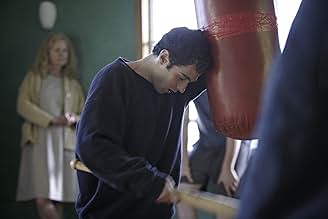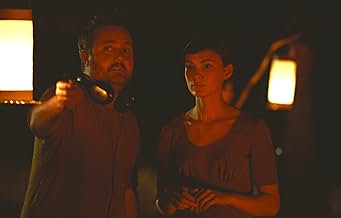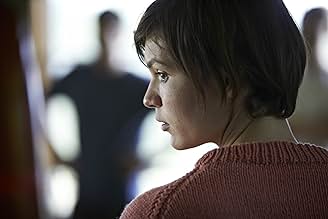One Eyed Girl
- 2013
- 1h 42m
IMDb RATING
5.4/10
1.5K
YOUR RATING
A young psychiatrist is haunted by the suicide of a patient and hovers on the verge of a breakdown. He meets an attractive representative of a secret church that promises salvation to its me... Read allA young psychiatrist is haunted by the suicide of a patient and hovers on the verge of a breakdown. He meets an attractive representative of a secret church that promises salvation to its members.A young psychiatrist is haunted by the suicide of a patient and hovers on the verge of a breakdown. He meets an attractive representative of a secret church that promises salvation to its members.
- Awards
- 2 wins & 1 nomination
Kate Cheel
- Rachel
- (as Katy Cheel)
Adom Carter
- Train Commuter
- (as Adom Kartor)
Adrian Gruszka
- Commuter
- (uncredited)
Emily McMahon
- Commuter
- (uncredited)
- Director
- Writers
- All cast & crew
- Production, box office & more at IMDbPro
Storyline
Did you know
- TriviaThe use of The Humming chorus from Madame Butterfly by Giacomo Puccini is a reference to Jennifer 8 that utilized the same track. The 90s Bruce Robinson thriller is a favorite of co-writers Nick Remy Matthews and Craig Behenna.
- SoundtracksPretty Little Girl Of Mine
Written by The Yearlings
Performed by Chris Parkinson, Robyn Chalklin, Michael Darren, Naomi Tillett, Michael Green
Featured review
The obvious theme behind this stylishly executed film is there in its tagline, 'what would you do for salvation?'. Or maybe, what could you do if in such a situation? Is it possible to make positive judgements when you are so depressed? Psychiatrist Travis (Mark Leanord Winter) isn't well. Living a city life with a city job, the world of his that we are introduced to is cold and emotionless, captured nicely with aerial views of the city. This is of course in contrast to his patients, who are filled with emotion. But Travis isn't well, and is barely listening to these patients. He wants to help them, but is unable to and in reality needs help himself. But being a psychiatrist, he can't talk to anyone about it, and starts the movie as an unlikeable person, someone who gets annoyed at people who offer him a pamphlet on a bus, a person who doesn't seem to care about his own patients.
Apart from the oft-ignored concept of 'debriefing', who are psychiatrist's psychiatrists? This is an interesting rumination as such a concept doesn't really exist, creating a main character who is immediately unlikable, but whose heart is good and transforms as the film progresses. His dwindling state of mental health is clearly the reason for his disinterest in his current patients, but it is made clear that this current state of health is due to the actions of a past patient. Unable to shake these memories from his head, he is essentially rendered useless and unable to do anything. Upon seeing the girl who tried to hand him a pamphlet earlier, this time he eagerly takes it. He attends one of their meetings, but nothing changes as memories of patients past continue to haunt him. Seeing no way out, he tries to take his life, but contacts the number on the pamphlet in a moment of panic. He wakes up in a rural community, and quickly learns what it is all about.
Travis is openly hostile when he first arrives, but his opinion begins to waver as the power of the community combined with his own desperation affects him. I have personally been in a very similar position and I must commend the filmmakers for the realistic depiction of these places and the people who reside there. The way the characters all honestly believe they are doing good, the emotionally heavy initiation scenarios Some research has obviously been done to depict such circumstances with such reality, and crucially, with believable characters, as the farm's community offers up quite the spectrum. Standing out clearly is ex-Iraq War veteran Father Jay (Steve Le Marquand), whose persuasive demeanor and military past make him the perfect enigmatic leader of a cult. While at times fearsome and almost always sly, he can also be kind and empathetic. He is a distorted mirror image of Travis – a broken man who believes he is helping people, but in reality is hurting them.
Travis' entrance to the community and his exceptions to some of their actions brings forward characters like Grace (Tilda Cobham-Hervey) and Tom (co-writer Craig Behenna) who each have their own moral line in the sand. These characters are in contrast to Jay's devoted disciples, who seem willing to do anything for him. To be saved. This contrast between characters, and what some of them will do for their beliefs, is what kick starts the third and thrilling act that falls down only in the execution of the final scene. This hardly ruins an amazing film though.
I find it hard to believe that there aren't any other Travis' in the world. What does a shrink do when they need help with their mental health? Talk to a colleague? This is a concept that is rarely explored in life, let alone in cinema. Congratulations must go to the team for writing about such a rarely touched on subject with such realism. Cults aren't such a rare subject for cinema, and most films exploring cults in a tasteful way will be probably be good by default. This film though takes it a step further with its deceitful, misguided characters and again its jagged realism that puts you in the farm as a viewer. The situation within the cult can be interpreted in different ways though. The pitfalls of co-dependent relationships, the power of suggestion, misguided attempts to help others, exploiting one's psychological pain for their own benefit are just a few ways of looking at it off the top of my head.
This a film that not only has a strong narrative, but one that can also say so much more, depending on the person watching it. I can't say that about many other films.
www.epilepticmoondancer.net
Apart from the oft-ignored concept of 'debriefing', who are psychiatrist's psychiatrists? This is an interesting rumination as such a concept doesn't really exist, creating a main character who is immediately unlikable, but whose heart is good and transforms as the film progresses. His dwindling state of mental health is clearly the reason for his disinterest in his current patients, but it is made clear that this current state of health is due to the actions of a past patient. Unable to shake these memories from his head, he is essentially rendered useless and unable to do anything. Upon seeing the girl who tried to hand him a pamphlet earlier, this time he eagerly takes it. He attends one of their meetings, but nothing changes as memories of patients past continue to haunt him. Seeing no way out, he tries to take his life, but contacts the number on the pamphlet in a moment of panic. He wakes up in a rural community, and quickly learns what it is all about.
Travis is openly hostile when he first arrives, but his opinion begins to waver as the power of the community combined with his own desperation affects him. I have personally been in a very similar position and I must commend the filmmakers for the realistic depiction of these places and the people who reside there. The way the characters all honestly believe they are doing good, the emotionally heavy initiation scenarios Some research has obviously been done to depict such circumstances with such reality, and crucially, with believable characters, as the farm's community offers up quite the spectrum. Standing out clearly is ex-Iraq War veteran Father Jay (Steve Le Marquand), whose persuasive demeanor and military past make him the perfect enigmatic leader of a cult. While at times fearsome and almost always sly, he can also be kind and empathetic. He is a distorted mirror image of Travis – a broken man who believes he is helping people, but in reality is hurting them.
Travis' entrance to the community and his exceptions to some of their actions brings forward characters like Grace (Tilda Cobham-Hervey) and Tom (co-writer Craig Behenna) who each have their own moral line in the sand. These characters are in contrast to Jay's devoted disciples, who seem willing to do anything for him. To be saved. This contrast between characters, and what some of them will do for their beliefs, is what kick starts the third and thrilling act that falls down only in the execution of the final scene. This hardly ruins an amazing film though.
I find it hard to believe that there aren't any other Travis' in the world. What does a shrink do when they need help with their mental health? Talk to a colleague? This is a concept that is rarely explored in life, let alone in cinema. Congratulations must go to the team for writing about such a rarely touched on subject with such realism. Cults aren't such a rare subject for cinema, and most films exploring cults in a tasteful way will be probably be good by default. This film though takes it a step further with its deceitful, misguided characters and again its jagged realism that puts you in the farm as a viewer. The situation within the cult can be interpreted in different ways though. The pitfalls of co-dependent relationships, the power of suggestion, misguided attempts to help others, exploiting one's psychological pain for their own benefit are just a few ways of looking at it off the top of my head.
This a film that not only has a strong narrative, but one that can also say so much more, depending on the person watching it. I can't say that about many other films.
www.epilepticmoondancer.net
- punishable-by-death
- May 12, 2015
- Permalink
Details
Box office
- Budget
- A$1,100,000 (estimated)
- Runtime1 hour 42 minutes
- Color
- Aspect ratio
- 2.35 : 1
Contribute to this page
Suggest an edit or add missing content





























